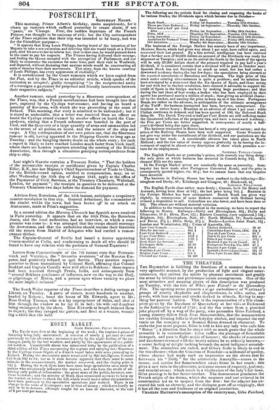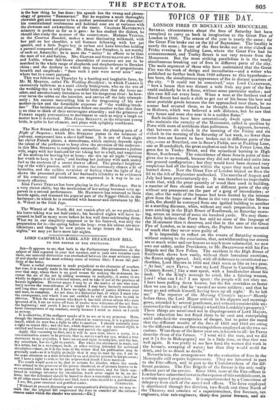THE THEATRES.
THE Haymarket is fulfilling the functions of a summer theatre in a very agreeable manner, by the production of light and elegant enter- tainments, that enliven the spirits by pleasant merriment and gratify the sense by brilliant and picturesque scenic arrangements. One of the most attractive and amusing pieces of this description was produced on Tuesday, with the title of Who's your Friend? or the Queensbery Fête. The opening scene presents a stage embodiment of WArreetr's groups of courtly shepherds and shepherdesses, in silks, satins, and jewels, with lace aprons and crooks decked in ribauds, flirting in any- thing but pastoral fashion. This is the representation of a fate cham- petre given by the Dutchess of Queensbery at her villa at Richmond to the fashionable world of 1728 ; and the fun arises from a practical joke played off by a wag of the party, who persuades Giles Fairland, a young country-fellow fresh from Somersetshire, that the masqueraders are wealthy farming folks in their holyday clothes, and imposes the real rustic on the company as a Russian Baron dressed in character. To make the jest more piquant, Giles is told to kiss any lady who calls him " Baron " ; a direction that he oheyd with so much gusto that the whole assembly is in consternation : Giles ruffles the plumage of formidable dowagers, and puts to flight maids of honour ; the cheeks of countesses and dutchesses resouud with the hearty salutes he so ardently bestows,— a secret feeling of delight lurking beneath the acted indignant astonish- ment. The constables are called, and Giles's frolic is likely to end in the roundhouse ; when the Countess of Rosedale—a milkmaid of quality, whose charms had made such an impression on the clown that he forswears his " Dolly " for the aristocratic Amaryllis—comes to the rescue, and carries her Somersetshire swain home in her coach : this gives a new turn to the adventure, and some scenes of coquetry, jealousy, and scandal ensue; which result in a vindication of the lady's fair fame, Giles proving to be her foster-brother. The denouement proclaims the French origin of the drama, which the neatness and tact evinced in its construction led us to suspect from the first : but the adapter has ex- ecuted his task so cleverly, and the dialogue goes off so trippingly, that it has all the ease and freshness of an original production. CHARLES MATHEWS'S assumption of the countryman, Giles Fairland, is the best thing he has done : his speech has the twang and phrase- ology of genuine " Zummerzet." But he requires a more thoroughly clownish Fait and manner to be a perfect personation of the character : his constitutional restlessness and habitual ease are at 'variance with the slowness and awkwardness of the rustic. CHARLES MerrnEws's mimicry is perfect as far as it goes : he has studied the dialect, he should also study the manner of the countryman. Madame VESTRIS, as the Countess Rosedale, makes a most fascinating milkmaid, with her pail on her shoulder, a tall footman following with her pet spaniel, and a little Negro boy in turban and knee-breeches holding parasol composed of plumes. Mr. Hou., her Strephon, is not worthy of such an Amaryllis: he is more the " miller" he affects to be than the man of NI it and fashion. Mrs. GLOVER and STRICKLAND are a Chloe and Lubin, whose full-blown absurdities of costume are not to be matched in the whole range of shepherds and shepherdesses in Dresden china ; and the drollery in which they luxuriate is of proportionate breadth and amplitude : " Sure such a pair were never seen " any- where but in a court pastoral.
This was followed on Thursday by a hustling and laughable farce, by Mr. M. MORTON, called The Wedding-Breakfast ; in which FARREN is excessively ludicrous as a staid elderly bridegroom, who on the eve of the wedding-day is told by his youthful bride-elect that she loves an- other, and unconsciously introduces to her his dangerous rival : he how- ever turns the tables on the intruder, and carries off the lady triumph- antly ; his success reconciling him to the dragooning of his new mother-in-law and the formidable expenses of " the wedding-break- fast." The incidents and situations follow one another so fast that there is no time to think of their extravagant absurdity ; and the grimaces of FARREN supply provocatives to merriment to such as enjoy a laugh uo matter how it is excited. Miss JULIA BENNETT, as the reluctant young bride, is quite in her element, and plays with sprightly confidence.



























 Previous page
Previous page